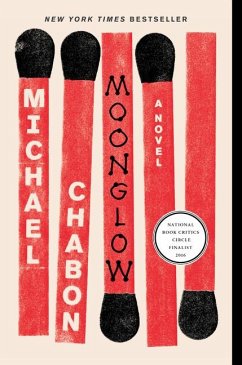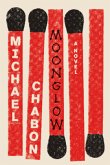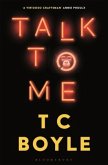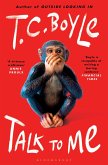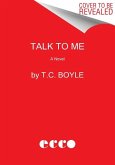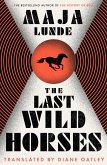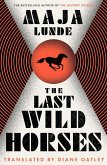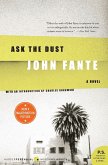NEW YORK TIMES BESTSELLER
Winner of the Sophie Brody Medal - An NBCC Finalist for 2016 Award for Fiction - ALA Carnegie Medal Finalist for Excellence in Fiction - Wall Street Journal's Best Novel of the Year - A New York Times Notable Book of the Year - A Washington Post Best Book of the Year - An NPR Best Book of the Year - A Slate Best Book of the Year - A Christian Science Monitor Top 15 Fiction Book of the Year - A New York Magazine Best Book of the Year - A San Francisco Chronicle Book of the Year - A Buzzfeed Best Book of the Year - A New York Post Best Book of the Year
iBooks Novel of the Year - An Amazon Editors' Top 20 Book of the Year - #1 Indie Next Pick - #1 Amazon Spotlight Pick - A New York Times Book Review Editors' Choice - A BookPage Top Fiction Pick of the Month - An Indie Next Bestseller
"This book is beautiful." - A.O. Scott, New York Times Book Review, cover review
Following on the heels of his New York Times bestselling novel Telegraph Avenue, Pulitzer Prize-winning author Michael Chabon delivers another literary masterpiece: a novel of truth and lies, family legends, and existential adventure-and the forces that work to destroy us.
In 1989, fresh from the publication of his first novel, The Mysteries of Pittsburgh, Michael Chabon traveled to his mother's home in Oakland, California, to visit his terminally ill grandfather. Tongue loosened by powerful painkillers, memory stirred by the imminence of death, Chabon's grandfather shared recollections and told stories the younger man had never heard before, uncovering bits and pieces of a history long buried and forgotten. That dreamlike week of revelations forms the basis for the novel Moonglow, the latest feat of legerdemain from Pulitzer Prize-winning author Michael Chabon.
Moonglow unfolds as the deathbed confession of a man the narrator refers to only as "my grandfather." It is a tale of madness, of war and adventure, of sex and marriage and desire, of existential doubt and model rocketry, of the shining aspirations and demonic underpinnings of American technological accomplishment at midcentury, and, above all, of the destructive impact-and the creative power-of keeping secrets and telling lies. It is a portrait of the difficult but passionate love between the narrator's grandfather and his grandmother, an enigmatic woman broken by her experience growing up in war-torn France. It is also a tour de force of speculative autobiography in which Chabon devises and reveals a secret history of his own imagination.
From the Jewish slums of prewar South Philadelphia to the invasion of Germany, from a Florida retirement village to the penal utopia of New York's Wallkill prison, from the heyday of the space program to the twilight of the "American Century," the novel revisits an entire era through a single life and collapses a lifetime into a single week. A lie that tells the truth, a work of fictional nonfiction, an autobiography wrapped in a novel disguised as a memoir, Moonglow is Chabon at his most moving and inventive.
Hinweis: Dieser Artikel kann nur an eine deutsche Lieferadresse ausgeliefert werden.
Winner of the Sophie Brody Medal - An NBCC Finalist for 2016 Award for Fiction - ALA Carnegie Medal Finalist for Excellence in Fiction - Wall Street Journal's Best Novel of the Year - A New York Times Notable Book of the Year - A Washington Post Best Book of the Year - An NPR Best Book of the Year - A Slate Best Book of the Year - A Christian Science Monitor Top 15 Fiction Book of the Year - A New York Magazine Best Book of the Year - A San Francisco Chronicle Book of the Year - A Buzzfeed Best Book of the Year - A New York Post Best Book of the Year
iBooks Novel of the Year - An Amazon Editors' Top 20 Book of the Year - #1 Indie Next Pick - #1 Amazon Spotlight Pick - A New York Times Book Review Editors' Choice - A BookPage Top Fiction Pick of the Month - An Indie Next Bestseller
"This book is beautiful." - A.O. Scott, New York Times Book Review, cover review
Following on the heels of his New York Times bestselling novel Telegraph Avenue, Pulitzer Prize-winning author Michael Chabon delivers another literary masterpiece: a novel of truth and lies, family legends, and existential adventure-and the forces that work to destroy us.
In 1989, fresh from the publication of his first novel, The Mysteries of Pittsburgh, Michael Chabon traveled to his mother's home in Oakland, California, to visit his terminally ill grandfather. Tongue loosened by powerful painkillers, memory stirred by the imminence of death, Chabon's grandfather shared recollections and told stories the younger man had never heard before, uncovering bits and pieces of a history long buried and forgotten. That dreamlike week of revelations forms the basis for the novel Moonglow, the latest feat of legerdemain from Pulitzer Prize-winning author Michael Chabon.
Moonglow unfolds as the deathbed confession of a man the narrator refers to only as "my grandfather." It is a tale of madness, of war and adventure, of sex and marriage and desire, of existential doubt and model rocketry, of the shining aspirations and demonic underpinnings of American technological accomplishment at midcentury, and, above all, of the destructive impact-and the creative power-of keeping secrets and telling lies. It is a portrait of the difficult but passionate love between the narrator's grandfather and his grandmother, an enigmatic woman broken by her experience growing up in war-torn France. It is also a tour de force of speculative autobiography in which Chabon devises and reveals a secret history of his own imagination.
From the Jewish slums of prewar South Philadelphia to the invasion of Germany, from a Florida retirement village to the penal utopia of New York's Wallkill prison, from the heyday of the space program to the twilight of the "American Century," the novel revisits an entire era through a single life and collapses a lifetime into a single week. A lie that tells the truth, a work of fictional nonfiction, an autobiography wrapped in a novel disguised as a memoir, Moonglow is Chabon at his most moving and inventive.
Hinweis: Dieser Artikel kann nur an eine deutsche Lieferadresse ausgeliefert werden.
"Elegiac and deeply poignant ... Chabon weaves these knotted-together tales together into a tapestry that's as complicated, beautiful and flawed as an antique carpet.... Chabon is one of contemporary literature's most gifted prose stylists.... In Moonglow, he writes with both lovely lyricism and highly caffeinated fervor." Michiko Kakutani, New York Times

Heldentum beruht auf mangelnder Ausbildung: In seinem Roman "Moonglow" erzählt Michael Chabon gewitzt von den abenteuerlichen Verwicklungen einer jüdischen Familie ins Weltgeschehen des zwanzigsten Jahrhunderts.
Das letzte Reich der Abenteuer ist die eigene Familie. Überall sonst bietet die durchzivilisierte Welt Geborgenheit, Struktur und Sicherheit; die Zeit, da furchtlose Helden auf Abenteuersuche in die Ferne ziehen konnten, ist bekanntlich längst vorbei. Heutzutage findet sich das Ungewisse, Fremde und Gefahrvolle zu Hause, im Familienkreise, wo die schwärzesten Abgründe klaffen und doch so routiniert wie sorgsam überbrückt werden. Da braucht es schon besonderen Mut und Grund, das Abkommen von Scham und Schweigen zu durchbrechen und sich ins Unbekannte des Vertrauten vorzuwagen.
Der nette Onkel Ray zum Beispiel, Großvaters jüngerer Bruder: stets war er für Spaß und gute Laune zuständig, ein Lebemann und Partylöwe alter Schule, immer tadellos gekleidet, mit Augenklappe wie Moshe Dayan und Vorliebe für schnelle Autos, dabei fürsorglich bemüht, der Familie in Notzeiten nach Kräften beizustehen; als Großvater im Gefängnis und Großmutter in der geschlossenen Anstalt war, hat er sich seiner halbwüchsigen Nichte angenommen. Jahrzehnte später erst, lange nach seinem Tod, kommt deren Sohn mit einem Mal dahinter, um was für ein Verhältnis es da ging. Und versteht zugleich, was auf dem vergilbten Schwarzweißfoto zu sehen ist, das seine Mutter als Teenager mit Pfeil und Bogen zeigt, wie sie auf jemanden außerhalb des Bildes zielt. Das Foto zählt zu den Habseligkeiten, die der Großvater, als er im Sterben liegt, noch bei sich hält, als müsse er die schreckliche Geschichte, die dahintersteht, im Griff behalten. Jahrzehntelang hat er, wie alle anderen Familienmitglieder, zu Onkel Rays Vorlieben geschwiegen. An seinen letzten Lebenstagen aber, Ende 1989, unter der Einwirkung vielleicht der starken Schmerzmittel, die ihm verabreicht werden, beginnt er seinem Enkel zu erzählen. Als in Berlin die Mauer fällt, fallen auch am Sterbebett die Schranken und geben den Blick auf Ungeheuerliches frei.
Das ist die Ausgangslage von Michael Chabons neuem Roman, einer ausschweifenden Abenteuererzählung, die sich als Memoirenbuch seiner Familie ausgibt. Sie umspannt drei Generationen und ein knappes Jahrhundert, springt in schönster Unordnung zwischen den Zeitebenen und verschiedenen Orten, an die es Großvater auf seinem langen und bewegten Lebensweg verschlagen hat, und springt zugleich, ganz wie die unwillkürliche Erinnerung, zwischen welthistorischem Geschehen - Weltkrieg, Holocaust, Sputnik-Schock, Mondlandung - und den persönlichen Verwicklungen einer jüdischen Familie, die eigentlich nur Ruhe und Normalität sucht, doch diese allenfalls zum Anschein und um den Preis andauernder Verleugnung wahren kann.
So gelangen wir von Kalifornien im Jahr 1989, wo der Großvater im Sterben liegt, zurück nach Baltimore in den frühen Fünfzigern, wo er eine faszinierende Französin trifft, die samt kleiner Tochter knapp dem Holocaust entkommen ist, ihrem Trauma aber ausgeliefert bleibt und mit der er bald eine Familie gründet. Zwischendrin gelangen wir nach Deutschland Mitte der Vierziger, wo Großvater in den letzten Kriegswirren als junger GI und Agent mit Geheimauftrag unterwegs ist - seine Mission lautet, Wernher von Braun aufzuspüren, den legendären Wissenschaftler und Konstrukteur der V2-Rakete, der seine genialen Erfindungen mit Hilfe von KZ-Häftlingen in die Welt gesetzt hat, sich kurz vor der Kapitulation tatsächlich den Amerikanern ausliefert und in den Vereinigten Staaten bald darauf Leiter des Mondflug-Programms wird. Außerdem gelangen wir nach Florida in den frühen Achtzigern, wo Großvater als Witwer und Rentner auf Schlangenjagd geht und dabei eine späte Liebe findet, sowie nach New York in den Sechzigern, als er nach einem Mordversuch an seinem Chef in einer reformierten Haftanstalt einsitzt, wo ihm die eigenen Kenntnisse vom Raketenbau durchaus zugutekommen sollen. Übermittelt wird uns all dies von seinem Enkel, einem protokollierenden Erzähler, der sich Mike Chabon nennt, Erfolgsromane schreibt und mit seinem Autor etliche weitere Gemeinsamkeiten teilt.
Dennoch sollte man sich hüten, den Behauptungen des Autobiographischen unbedacht zu folgen. Memoiren sind immer auf ein erinnerndes Subjekt zentriert und folgen ihren eigenen Wahrheitsregeln. Deshalb antwortet der Großvater auch auf die Frage, ob denn alles, was er da erzählt, die Wahrheit sei: "Ist alles so, wie ich mich erinnern kann. Darüber hinaus kann ich für nichts garantieren." Das gilt erst recht bei einem Autor wie Chabon, der nie Garantien übernimmt und stets den größten Spaß für sich wie seine Leser findet, wenn er sich ein Genremuster derart perfekt zu eigen macht, dass er mit dessen Regeln nach Belieben spielen kann. Das gelang ihm vor zehn Jahren in "Die Vereinigung jiddischer Polizisten" mit dem Krimigenre und zuvor im Pulitzerpreis-gekrönten Roman "Die unglaublichen Abenteuer von Kavalier und Clay" mit dem Comic. Stets ist es bei ihm die Macht der Fiktion, die sich stärker als das Faktische erweist.
Zumal bei Familiengeschichten fällt es schwer, eine strikte Trennlinie zwischen Erfahrung und Erfindung zu ziehen, denn im Geflecht familiärer Beziehungen kann es kaum jemals einen Standpunkt außerhalb der vielfachen Verwicklungen geben. Wer daher die Spuren aufnimmt und den Fäden folgt, gelangt zu unerwarteten Erkenntnissen, während er sich selbst weiter verstrickt. So ergeht es dem Erzähler hier, beispielsweise wenn er überrascht entdeckt, dass es mit der tätowierten sechsstelligen Zahl auf Großmutters Unterarm eine ganz andere Bewandtnis hat, als alle immer dachten. Und auch für uns wird die Lektüre dieses geschichtenprallen, anrührenden und oftmals ungemein komischen Buches umso reicher, je rückhaltloser wir uns einfach von der Fülle seiner Abenteuer fesseln lassen und das Bedürfnis, Ordnung oder Übersicht zu schaffen, einstweilen zurückstellen.
Dazu spinnt dieser Autor nämlich zahlreiche Erzählfäden weiter, die man aus anderen Zusammenhängen kennt - unverkennbar beispielsweise die Verbindungen zu einem amerikanischen Schlüssel- und Rätselroman, der sich ebenfalls an Wernher von Brauns Konstruktionen abarbeitet, Thomas Pynchons "Gravity's Rainbow", dessen postmoderne Ballistik bei Chabon aber in der Schwejk-Geschichte von Großvaters Agententätigkeit geerdet wird. Insbesondere für deutsche Leser ist es zudem aufschlussreich, Chabons erfindungsreiche Familienmemoiren mit jener anderen Familiengeschichte zu verbinden, die Christina von Braun, Wernhers Nichte, vor zehn Jahren vorgelegt hat: In "Stille Post" geht sie ihrerseits auf Suche nach verschwiegenen Botschaften, die in der Nachrichtenkette ihrer Familie über die Zeiten nur verschlüsselt weitergegeben werden konnten, ehe eine folgende Generation sie von neuem, das heißt nach eigenem Vermögen und wohl auch eigenem Bedürfnis, entziffert: "Der stillen Post ist die Wahrheit egal. Sie gibt weiter, was der Empfänger hören will. Sie verwandelt ihre Nachrichten."
Von solcherlei Verwandlungen erzählt auch Michael Chabon in "Moonglow" - wortgewaltig, witzig und mit großer Lust am Anverwandeln. Dazu nutzt er ausgerechnet einen Helden, der nicht gern Romane liest und allem Heldentum misstraut. Denn, ganz Ingenieur und Techniker, setzt Großvater pragmatisch auf das Lern- und Machbare: seiner Ansicht nach ist Heldentum "immer ein Abfallprodukt mangelhafter Ausbildung. Wer gut ausgebildet war, hoffte nämlich, Abenteuer zu vermeiden." Das mag als Maxime des Lebens taugen. Der Lustgewinn des Lesens aber folgt genau daraus, dass die Vermeidungsstrategie misslingt: was bliebe auch der Literatur sonst? Einen Onkel Ray will man gewiss keiner Familie wünschen. Doch gerade dieser herrlich abenteuerliche Roman lässt uns spüren, dass von glücklichen Familien kaum je so viel zu erzählen ist.
TOBIAS DÖRING
Michael Chabon: "Moonglow". Roman.
Aus dem amerikanischen Englisch von Andrea Fischer. Verlag Kiepenheuer & Witsch, Köln 2018. 496 S., geb., 24,- [Euro].
Alle Rechte vorbehalten. © F.A.Z. GmbH, Frankfurt am Main
'The product of a writer in full command of his novelistic faculties ... Not only probably Chabon's greatest, but an example of a piece of sustained writing that will be hard to see outdone in 2017' The Times
'Funny, moving and tremendously entertaining, this is a novel about the narratives we construct for ourselves and the need we have for them, one that confirms Chabon not just as an irresistible tale-teller, but also a master' Daily Mail
'A masterclass in storytelling' Independent
'Entirely sure footed, propulsive, the work of a master at his very best. The brilliance of Moonglow stands as a strident defence of the form itself, a bravura demonstration of the endless mutability and versatility of the novel' Observer
'Chabon's storytelling is so characteristically exuberant, the narratives so unfailingly rich' Telegraph
'"It doesn't add up to anything," stated the grandfather, as he looks back at his life. "It doesn't mean anything." Luminous with love, Moonglow is here to show us that it does' Irish Independent
'Chabon is virtuoso' Irish Times
'Moving, wry, thoroughly entertaining' FT
'Much of Moonglow feels Dickensian in style, and as with Dickens it is rich in sentiment. This is to the novel's credit ... Exquisite' TLS
'Comparable to the young Paul Auster ... It's as intriguing as a locked room mystery, but in keeping with Chabon's canon, also has a heart the size of an elephant' Big Issue
'A wondrous book that celebrates the power of family bonds and the slipperiness of memory ... A thoroughly enchanting story' The Washington Post
'A rich and exotic confection ... This book is beautiful' New York Times
'A poignant, engrossing triumph' People
'Chabon is one of contemporary literature's most gifted prose stylists ... In Moonglow, he writes with both lovely lyricism and highly caffeinated fervour' Michiko Kakutani, New York Times
'Funny, moving and tremendously entertaining, this is a novel about the narratives we construct for ourselves and the need we have for them, one that confirms Chabon not just as an irresistible tale-teller, but also a master' Daily Mail
'A masterclass in storytelling' Independent
'Entirely sure footed, propulsive, the work of a master at his very best. The brilliance of Moonglow stands as a strident defence of the form itself, a bravura demonstration of the endless mutability and versatility of the novel' Observer
'Chabon's storytelling is so characteristically exuberant, the narratives so unfailingly rich' Telegraph
'"It doesn't add up to anything," stated the grandfather, as he looks back at his life. "It doesn't mean anything." Luminous with love, Moonglow is here to show us that it does' Irish Independent
'Chabon is virtuoso' Irish Times
'Moving, wry, thoroughly entertaining' FT
'Much of Moonglow feels Dickensian in style, and as with Dickens it is rich in sentiment. This is to the novel's credit ... Exquisite' TLS
'Comparable to the young Paul Auster ... It's as intriguing as a locked room mystery, but in keeping with Chabon's canon, also has a heart the size of an elephant' Big Issue
'A wondrous book that celebrates the power of family bonds and the slipperiness of memory ... A thoroughly enchanting story' The Washington Post
'A rich and exotic confection ... This book is beautiful' New York Times
'A poignant, engrossing triumph' People
'Chabon is one of contemporary literature's most gifted prose stylists ... In Moonglow, he writes with both lovely lyricism and highly caffeinated fervour' Michiko Kakutani, New York Times

